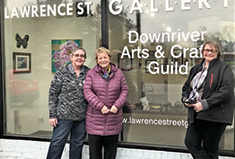Slipstream
Story By David Wesley
Bailey Boudreaux is the owner and manager of Ferndale’s Slipstream theatre. The man behind one of the city’s oldest and most prestigious theaters tells me of a dark, troubled youth that led to the life-saving work he does now with a new family and ripe, iridescent view on life. He tells Ferndale Friends, “I was a troubled child and went through a hard time, but who didn’t? I found my home among the theatre crowd and ended up in a performing arts high school. I went to college for acting, and left to do a national tour. I landed in Chicago after that, working as an actor and cabaret artist. I came back to Michigan after years away because I wanted to reconnect with my roots. “
But I found myself in a downward spiral once I was back. My high school and college friends were moving on to the most recognizable definitions of “success” and I fell into despair. I spent many years as an alcoholic, and contemplated throwing it all away. Many times. But I came through, with the help of a great program and support system, and a very special friend who left us too soon, but taught me more in a short time than hundreds had in my lifetime. I got through it, and am seven years sober. “
I have found my truest home with the company members of Slipstream, and for the first time in my life, understand what the word family actually means. It took me way too long to understand that word, and to be able to define success. These are thoughts that keep me going, and make me passionate about ensuring young people are heard, encouraged, and not confined to labels, stereotypes, or a pre-determined life plan set out for them before they had any kind of say.”
Bailey’s background is steeped in chaos, color and esprit. Both have brought so much energy,entertainment and talent to Ferndale that it’s time the story is told for everyone.
FF: How did Slipstream come about and how did it end up in Ferndale?
BB: Slipstream started in a way most unique things do; as a conversation between two good friends about hypotheticals. Jennifer Jolliffe and I had just celebrated her birthday, and settled in to talk about aspirations, how we got to where we were, etc. She asked me if I could do anything with my life, what would it be. I answered before thinking about it, that I would start a theater company. And the thoughts kept coming. I didn’t want a company that would compete with other companies. I wanted one that would bring the community together, or at least offer a filler between established companies’ shows. The hook? I was tired of seeing “A Doll’s House” done as a stuffy museum piece. I was sure that if Ibsen saw it today, he would revoke the rights. It was banned when it was written. Ibsen was making a huge statement and sacrificing his own income and reputation by doing so. When it’s presented today, it is treated as a delicate piece of art that remains a piece of history. But it isn’t. It is a visceral and vital part of women’s rights, and its themes are just as, if not more so, relevant today than they were back then.
From that example came many others – why was Hedda Gabler always seen as this maniacal villain? She was a disturbed human being, who had the brains and the skill to succeed but lacked the appropriate gender for the time. The same thoughts came about other classics and their modern day treatments. So the goal became to produce classical theatre in a way that got younger audiences invested in the modern day authenticity of the works’ themes and relevance. This is not to say classics produced as classics are bad, or doing a dis-service, there is a great need for them. But there is also a need to remind people what made them classics in the first place.
The other concept that I was completely devoted to was the idea of a closed company. Not because the idea of exclusivity intrigued me – in fact, it was terrifying. The last thing you want to do is start a company and automatically come across as elitist. But that built in trust that happens within the closed BFA programs at colleges and rep companies all over the country seemed to me an essential element in getting actors to do their best work. I had been in many productions where gossip and scandal made it nearly impossible for the actors to feel comfortable enough with their scene partners to really dive into the work that needed to be done. I thought that by making the company a small one with actors working together consistently, barriers would be broken down and the process of collaborating and devising things as a group would fuel the final product.
colleges and rep companies all over the country seemed to me an essential element in getting actors to do their best work. I had been in many productions where gossip and scandal made it nearly impossible for the actors to feel comfortable enough with their scene partners to really dive into the work that needed to be done. I thought that by making the company a small one with actors working together consistently, barriers would be broken down and the process of collaborating and devising things as a group would fuel the final product.
The other thing we wanted to make sure we had in place was a company that invited in and helped to train young artists. We started through classes, and tried out workshops before deciding that the best experience was hands on. So we started casting younger actors in our shows. To give them the resume item as well as the real life experience of working with professional actors in a tight time frame and on a very limited budget.
I live in Ferndale, and after having lived many places, Ferndale is by far my favorite. There is a weird, “Pleasantville” kind of feel to this town that makes it one-of-a-kind. We started as a mobile company, with our eyes on Detroit, but eventually settled in Ferndale because we found the building that spoke to us. Call it kismet or a good market. Either way, this is where we ended up and couldn’t be more thrilled.
FF: How did you get involved in Slipstream and how has it grown since its inception?
BB: The idea was mine. The assurance and faith was Jen’s. Together we make a heck of a team. When I lacked confidence, she used logic to convince me of the merits of the company. And likewise, when the logistic merits seemed daunting to her, I used the creative aspect to remind her of its viability. We started as vagabonds and did not think we would have a permanent home by our second season. But that’s what happened. The company has grown, and shrunk, and grown, always keeping the founding members, Graham Todd, Luna Alexander, Steve Xander Carson, Ryan Ernst (to name a few) involved. In season one, we switched technical directors halfway through and Ryan took over all our set building and design, on top of playing leading roles. Steve became our resident fight choreographer and movement specialist, as well as our leading man. Luna has since become Associate Artistic Director and she and I take turns directing the shows this season. We are hoping to bring in a guest director per season as well. So much has changed, or rather, grown, since Slipstream’s inception. We have become a family and we are not afraid to take risks. Sometimes it pays off, and other times it doesn’t – and then, like anything else in life, we learn from our mistakes, and become better artists and creative members of the community because of these “growing pains.” We are learning what it means to create the kind of work we want to create while also balancing what the public cares to see, and what opportunities we can open for younger artists.
FF: How does Slipstream compare with other theaters in the Metro and Downtown areas? What sets Slipstream apart?
BB: This question always gets me. I think every theatre in this area has found their own niche. Comparing them is what gets us into trouble as a pretty tightly stretched community in general. Each theatre has its own way about it, its own favorite actors that are used repeatedly, and its own unique line up of shows. We do classics, and we do them in highly conceptualized ways. I’m sure we’re not the first company to do that, and we certainly won’t be the last. But if there had to be one difference, that would probably be it. That, and the closed company aspect. But each theatre in the area is working hard to put on amazing productions and keep the business afloat. We all share the same audience. So trying to alienate one, praise another, or dismiss one really does a disservice to the artists in the community as well as the patrons who support us all.
FF: What are the plans for Slipstreams future?
BB: We plan to keep going, producing seven works per season and one original work as an encore to the season. We were thrilled with our Halloween spectacular this past season and will probably continue that. Building in traditions is essential to the success of any theatre company, but learning what is tradition and what is simply dumb luck is a difficult lesson. We are also starting to bring workshops and specified shows to high schools in the area. We have expanded by having Puzzle Piece share our space as well, and try to do as much as we can to pair with local businesses and charities. Our goals remain certain — to produce effective and relevant classic works while building the artistic and communal society in which we live. We want the arts to thrive, we want businesses to thrive, we want the Metro Detroit area to thrive. We want to do our part to ensure the area’s future is rich with culture and that the youthof tomorrow has a place to call home.
Slipstream Theatre Initiative
www.slipstreamti.com
460 Hilton, Ferndale MI 48220
If some happened with our heartiness, we believe there is a solution to any maladies in a preparation. What medicines do patients purchase online? Viagra which is used to treat impotence and other states coupled to erectile dysfunction. Learn more about “sildenafil“. What people talk about “viagra stories“? The most substantial aspect you must look for is “sildenafil citrate“. Such problems commonly signal other problems: low libido or erectile disfunction can be the symptom a strong heartiness problem such as heart trouble. Causes of sexual dysfunction switch on injury to the penis. Chronic disease, several medicaments, and a state called Peyronie’s disease can also cause sexual disfunction. Even though this medicine is not for use in women, it is not known whether this medication passes into breast milk.



